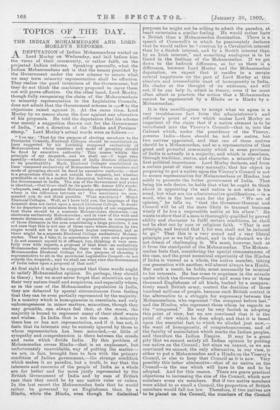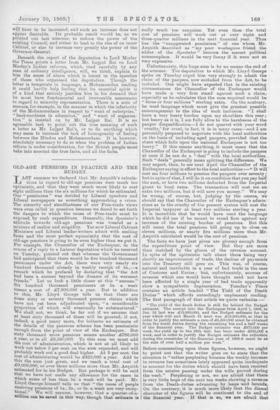TOPICS OF THE DAY.
THE INDIAN MOHAMMEDANS AND LORD MORLEY'S REFORMS.
ADEPUTATION of Indian Mohammedans waited on Lord Morley on Wednesday, and laid before him the views of their community, or rather faith, on the projected Indian reforms. Speaking generally, what the Indian Mohammedans ask is that the means provided by the Government under the new scheme to secure what we may term minority representation shall be effective. They realise the good intentions of the Government, but they do not think the machinery proposed to carry them out will prove effective. On the other band, Lord Morley, though fully, recognising the claim of the Mohammedans to minority representation in the Legislative Councils, does not admit that the Government scheme is °pet to the objections raised against it. At the same time, Lord Morley by no means slams the door against any alteration of his proposals. He told the deputation that his scheme was merely a suggestion thrown out for the•Government of India, "not a direction of the Medes and Persians' stamp." Lord Morley's actual words were as follows :— "You say : 'That for the purpose of electing members to the Provincial Councils, Electoral Colleges should be constituted on lines suggested by his Lordship composed exclusively of Mohammedans whose numbers and mode of grouping should be fixed by executive authority.' This comes within the principle of my despatch, and we shall see—I hope very speedily—whether the Government of India disclose objections to its practicability. Mark, Electoral Colleges constituted on lines 'composed exclusively of Mohammedans whose numbers and mode of grouping should be fixed by executive authority,'—that is a proposition which is not outside the despatch, but whether practicable or not is a matter for discussion between us hero and the Government in India. The aim of the Government and yours is identical,—that there shall be (to quote Mr. Ameer All's words) adequate, real, and genuine Mohammedan representation.' Now, where is the difference between us ? The machinery we com- mended you do not think possible. What machinery ? Mixed Electoral Colleges. Well, as I have told you, the language of the despatch does not insist upon a mixed Electoral College. It would be no departure in substance from the principle of our suggestion that there should be a separate Mohammedan electorate,—an electorate exclusively Mohammedan; and in view of the wide and remote distances, and difficulties of organisation in consequence of those distances in the area constituting a large province, I am not sure that this is not one of those cases where election by two stages would not be in the highest degree convenient, and so there might be a separate Electoral College exclusively Moham- medan. That is, I take it, in accordance with your own proposal. I do not commit myself to it offhand, but, thinking it very care- fully over with experts, a proposal of that kind—an exclusively Mohammedan electorate sending their votes to an exclusively Mohammedan Electoral College for the purpose of choosing a representative to sit in the provincial Legislative Council—is not outside the despatch ; and we shall see what view the Government of India takes upon a proposal of that sort."
At first sight it might be supposed that these words ought to satisfy Mohammedan opinion. So, perhaps, they should in theory ; but we must never forget that minorities are by their very nature timid and suspicious, and especially where, as in the case of the Mohammedan population in India, they are debarred by special circumstances from feeling that they can be even partially represented by the majority. In a country which is homogeneous in essentials, and only unhomogeneous in minor matters, minorities, though they may grumble, can always feel that, at the worst, the majority is bound to represent many of their chief wants and wishes. In India that is not the case. A minority there has or has not representation, and if it has not, it feels that its interests may be entirely ignored by those to whom representation has , been accorded,—so little of sympathy and comprehension is there between the creeds and races which divide India. By this problem of Mohammedan ,versus Hindu—that is an unpleasant, but unfortunately, unavoidable, way of putting the matter— we are, in fact, brought face to face with the primary condition of Indian government,—the strange condition which makes it no paradox, but a truth, to say that the interests and concerns of the people of India as a whole are far better and far more justly represented by the British Government of India and by men of British race than they could be by any native ruler or rulers. In the last resort the Mohammedan feels that he would rather be governed by an Englishman than by a Hindu, while the Hindu, even though for dialectical purposes he might not be willing to admit the paradox, at heart entertains a similar feeling. He would rather have a British than a Mohammedan domination. There is a speech of Cromwell's in which he passionately declares that he would rather be "overrun by a Cavalierish interest than by a Scotch interest, and by a Scotch interest than by an Irish interest," and something analogous is to be found in the feelings of the Mohammedan. If we get down to the bedrock difference, so far as there is a difference, between Lord Morley and the Mohammedan deputation, we expect that it resides in a certain mental impatience on the part of 'Lord Morley at this absolute and irremediable want of 'homogeneity in India. He chafes at the thought of its existence, and will not, if he can help it, admit in theory, even if he must often admit in practice, the notion that a Mohammedan cannot be represented by a Hindu or a Hindu by a Mohammedan.
It is this unwillingness to accept what we agree is a very troublesome fact from the, administrator's and. reformer's point of view which makes Lord Morley so impatient of the claim that if a native element is to be introduced into the Viceroy's Council—that is, into the Cabinet which, under the presidency of the Viceroy, governs India—there should be, not one native, but two native& appointed, and that one of these natives should be a Mohammedan, and so a representative of that great and powerful community which in some provinces of India is actually in a majority, and which is elsewhere, through tradition, status, and character, a minority of the first political importance. Lord Morley declares, and from a certain point of view very naturally, that his object in proposing to put a native upon the Viceroy's Council is not to secure representation for Mohammedans or Hindus, but solely to promote the better government of India. That being his sole desire, lie holds that what he ought to think about in appointing the said native is not, what is his creed, but what are his administrative qualifications,— in a word, who is the best man for the post. "We are of opinion," he tells us, "that the Governor-General and Council will be all the more likely to transact business . wisely if he has a responsible native at his elbow.", He wants to show that if a man is thoroughly qualified by proved ability and character to fulfil certain conditions, he .shall not be shut out by race or religion faith. "That is our principle, and beyond that I, for one, shall not be induced to go. That this is a very sound and a very liberal principle per se we fully admit, and in the abstract we .do not dream of challenging it. We must, however, look at it from the standpoint of the Mohammedan. The Moham- medan feels that, considering the special circumstances of the case, and the great numerical superiority of the Hindus if India is viewed as a whole, the native member, taking one generation with another, will almost alwayi be a Hindu. But such a result, he holds, must necessarily be inimical to his interests. He has come to acquiesce in the miracle under which the Governor-General and some two or three thousand Englishmen of all kinds, backed by a compara- tively small British army, control the destinies of three hundred millions of people, because such British control is the alternative to a struggle for supremacy between the Mohammedans, who represent "the conquest before last," and the Hindus, who represent those whom he regards as the "conquered." He may be very foolish in adopting this point of view, but we are convinced that it is the point of view which he does adopt, and that it is based upon the essential fact. to which we alluded just now,— the want of homogeneity, of comprehensiveness, and of the faculty of assimilation which marks the Indian peoples, and therefore the Indian Empire. It may be a great pity that we cannot satisfy all Indian opinion by putting one native on the Council; but since.we 'cannot, as we are convinced we cannot, the only alternative, in our vie*, is either to put a Mohammedan and a Hindu on the Viceroy's Council, or else to keep that Council as it is now. Very possibly this latter alternative—that of no native on the Council—is the one which will have in the end to be adopted. And for this reason. There are grave practical objections to increasing the size of the Council, which now numbers some six members. But if two native members were added to so small a Council, the proportion of British members would fall too low. Therefore, if two natives are to be placed on the Council, the numbers of the Council will have to be .increased, and such an increase does not appear desirable. Its probable result would be, as we pointed out last summer, to reduce the power of the existing Council, and either to lead to the rise of an inner Cabinet, or else to increase very greatly the power of the Governor-General: Beneath the report of the deputation to Lord Morley the Times prints a letter from Mr. Lajpat Rai on Lord Morley's Indian reforms, which, read carefully by any man of ordinary intelligence, will, we think, explain to him the sense of alarm which is latent in the speeches of those who organised the deputation. Though the letter is temperate in language, a Mohammedan reading it could hardly help feeling that its essential spirit is of a kind that entirely justifies hint in his demand that he must have fundamental and irrevocable assurances in regard to minority representation. There is a note of menace, for example, in the manner in which the inferiority of the Mohammedans in respect to "want of enterprise," "backwardness in education," and "want of organisa- tion" is insisted on by Mr. Laj pat Rai. It is no agreeable task to point out the true meaning of such a letter as Mr. La3pat Rat's, or to do anything which may seem to increase the lack of homogeneity of feeling between the Hindus and Mohammedans. It is, however, absolutely necessary to do so when the problem of Indian reform is under consideration, for the British people must take into account the true facts, and all the facts.

























































 Previous page
Previous page